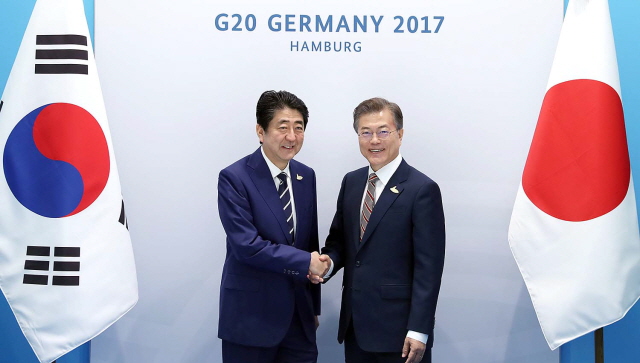이 웹사이트는 제19대 대통령 임기 종료에 따라 대통령기록관이 「대통령기록물 관리에 관한 법률」에 의해 이관받아 서비스하는 대통령기록물입니다. 자료의 열람만 가능하며 수정 · 추가 · 삭제는 불가능합니다.
다만, 「개인정보보호법」에 의하여 개인의 정보를 보호받기 원하시는 분은 관련 내용(요청자, 요청내용, 연락처, 글위치)을 대통령 웹기록물 담당자(044-211-2253)에게 요청해 주시면 신속히 검토하여 조치해 드리겠습니다. 감사합니다.
SPEECHES & REMARKS
BRIEFINGS

President Moon Jae-in, who is currently visiting Hamburg, Germany to attend the G20 Summit, and Japanese Prime Minister Shinzo Abe held a summit from 9:37 to 10:13 this morning. They had in-depth discussions on issues of mutual interest, including directions for the advancement of Korea-Japan relations and the North Korean nuclear issue.
President Moon began by saying that Korea and Japan were the closest friends both geographically and culturally, sharing basic values and strategic interests. He went on to express the hope that the two countries would work together to establish a forward-looking, mature and cooperative partnership while bringing the past wounds of history under proper management.
In response, Prime Minister Abe suggested that Japan and Korea, an invaluable neighbor that also shared strategic interests, should continue to cooperate based on close communication between the two leaders. For the sake of the development of bilateral ties, they agreed to restore reciprocal visits by the leaders of the two countries.
In this context, the Prime Minister expressed the hope for President Moon to visit Japan at an early date while President Moon invited the Prime Minister to visit Korea on the occasion of the 2018 PyeongChang Winter Olympics.
On top of this, the two leaders agreed to work together to make sure that the Korea-Japan-China summit would be held as early as possible. They also reached an agreement to make joint efforts to promote substantive cooperation, including revitalization of trade and investments, exchanges of young adults and tourism exchanges between the two nations.
Concerning the matter surrounding the victims of Japanese military`s wartime sexual slavery, the Japanese Prime Minister mentioned the necessity to carry out the 2015 agreement on the “comfort women” issue. For his part, President Moon said that there was something obstructing the two countries from getting closer. Noting that the majority of the Korean people were not accepting the agreement emotionally, the President said that it was necessary to admit such a reality in Korea, suggesting joint efforts to address the issue in a wise manner. The President also made it very clear that the issue should not stand in the way of progress of bilateral relations in other areas.
Following the trilateral dinner among the leaders of South Korea, the United States and Japan the day before, President Moon and Prime Minister Abe once again shared an understanding that the sophistication of North Korea’s nuclear and missile capabilities was an imminent and grave threat to both nations. Then, the two leaders agreed to continue to maintain and strengthen close cooperation between Korea and Japan and among Korea, the United States and Japan in order to peacefully achieve the complete dismantlement of the North Korean nuclear program while placing their utmost priority on the resolution of the North Korean nuclear issue.
In addition, President Moon mentioned the need for Korea to take the lead in setting conditions for peaceful unification of the Korean Peninsula and to resume inter-Korea dialogue. Prime Minister Abe expressed his understanding in that regard.
The bilateral summit, the first held since the inauguration of President Moon, is regarded as having contributed to building a relationship of trust between the two leaders and laying the foundation for future-oriented and mature cooperative partnership between the two nations.
Though the summit was rather brief, the two leaders had very earnest and faithful exchanges of opinions and agreed to meet often and continue their talk on the occasion of bilateral summits or on the sidelines of multilateral meetings.



